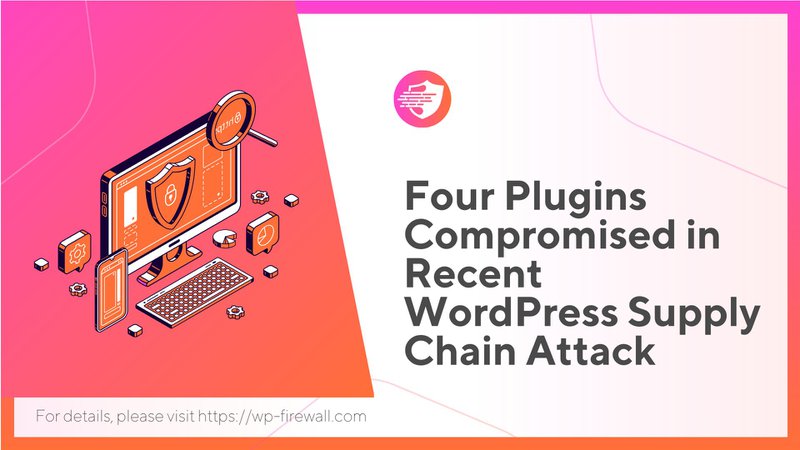
Wstęp:
W ciągle ewoluującym krajobrazie cyberbezpieczeństwa witryny WordPress stały się głównymi celami różnych form ataków. Jednym z najbardziej niepokojących ostatnich trendów jest wzrost ataków na łańcuch dostaw. Ataki te wykorzystują luki w zabezpieczeniach w procesie rozwoju i dystrybucji oprogramowania, co prowadzi do powszechnej i często niewykrywanej infiltracji złośliwego kodu. Niedawny incydent, w którym zhakowane hasła programistów doprowadziły do infekcji kilku wtyczek WordPress, podkreśla krytyczną potrzebę zaostrzonych środków bezpieczeństwa. Jako wiarygodne źródło informacji na temat bezpieczeństwa WordPress, WP Firewall zagłębia się w naturę tych ataków, dotknięte wtyczki i niezbędne środki bezpieczeństwa w celu ochrony Twojej witryny.
Zrozumienie ataku na łańcuch dostaw
Ataki na łańcuch dostaw wykorzystują słabości w procesie rozwoju i dystrybucji oprogramowania. Poprzez atakowanie źródła – takiego jak programiści lub infrastruktura, z której korzystają – atakujący mogą wprowadzić złośliwy kod, który rozprzestrzenia się szeroko, często pozostając niezauważonym, dopóki nie zostaną wyrządzone znaczne szkody. W niedawnym incydencie WordPress atakujący uzyskali dostęp do środowisk programistów za pomocą zhakowanych haseł. Pozwoliło im to na wstrzykiwanie szkodliwego kodu do aktualizacji wtyczek, które następnie były dystrybuowane za pośrednictwem oficjalnego repozytorium WordPress.
Wśród dotkniętych wtyczek znalazły się te powszechnie używane do różnych funkcji, co czyni atak szczególnie dalekosiężnym. Charakter tych ataków sprawia, że są one szczególnie niebezpieczne, ponieważ wykorzystują relacje zaufania w łańcuchu dostaw oprogramowania. Kiedy użytkownicy pobierają aktualizacje z tego, co uważają za zaufane źródło, nieumyślnie instalują zagrożony kod, narażając swoje witryny na potencjalne naruszenia danych, defacement lub inne złośliwe działania.
Wśród zagrożonych wtyczek znalazły się:
- Zaawansowane pola niestandardowe:Popularna wtyczka służąca do dodawania niestandardowych pól do ekranów edycji WordPressa.
- Resetowanie WP:Narzędzie umożliwiające przywracanie domyślnych wartości bazy danych WordPress bez konieczności modyfikowania plików.
- Duplikuj stronę: Służy do duplikowania wpisów, stron i niestandardowych typów wpisów w WordPressie.
- Resetowanie bazy danych WP: Umożliwia przywrócenie bazy danych WordPress do stanu domyślnego bez konieczności ponownej instalacji WordPressa.
Więcej informacji o dotkniętych wtyczkach
- Zaawansowane pola niestandardowe:Zamiar: Ta wtyczka jest niezbędna do dodawania niestandardowych pól do wpisów WordPress, stron i niestandardowych typów wpisów. Umożliwia deweloperom tworzenie niestandardowych pól i meta boxów, umożliwiając wysoce konfigurowalny system zarządzania treścią.
Cechy:Zapewnia przyjazny użytkownikowi interfejs umożliwiający dodawanie pól niestandardowych, obsługuje różne typy pól (tekstowe, graficzne, plikowe itp.) i płynnie integruje się z edytorem WordPress.
Przykłady zastosowań:Idealny do tworzenia złożonych formularzy, niestandardowych typów wpisów i rozszerzania funkcjonalności WordPressa w celu spełnienia wyjątkowych wymagań witryn internetowych. - Resetowanie WP:Zamiar: WP Reset pomaga deweloperom i administratorom witryn szybko zresetować bazę danych WordPress do ustawień domyślnych bez wpływu na pliki rdzeniowe. Jest to przydatne do celów testowych i rozwojowych.
Cechy:Resetowanie jednym kliknięciem, selektywne opcje resetowania, migawki umożliwiające przywracanie poprzednich stanów i obsługa poleceń WP-CLI.
Przykłady zastosowań: Powszechnie używane w środowiskach testowych w celu szybkiego resetowania baz danych, czyszczenia po obszernych testach lub przygotowania do nowego startu w trakcie rozwoju. - Duplikuj stronę:Zamiar: Ta wtyczka upraszcza proces duplikowania stron, postów i niestandardowych typów postów. Jest szczególnie przydatna do tworzenia szkiców lub szablonów na podstawie istniejącej treści.
Cechy:Duplikacja jednym kliknięciem, zgodność z niestandardowymi typami wpisów i opcje zarządzania zduplikowaną treścią.
Przykłady zastosowań:Często używane przez twórców treści w celu klonowania istniejących stron w celu uzyskania spójnego układu i formatowania, co ułatwia szybsze tworzenie i zarządzanie treścią. - Resetowanie bazy danych WP:Zamiar:Podobnie jak WP Reset, ta wtyczka pozwala użytkownikom zresetować bazę danych WordPress do stanu domyślnego bez konieczności całkowitej ponownej instalacji. Została zaprojektowana dla wygody i szybkości.
Cechy:Opcje selektywnego resetowania, funkcjonalność szybkiego resetowania i obsługa resetowania określonych tabel bazy danych.
Przykłady zastosowań:Przydatne dla programistów, którzy muszą często resetować bazę danych w trakcie cyklów rozwoju lub faz testowania.
Konsekwencje dla bezpieczeństwa WordPressa
Konsekwencje ataków na łańcuch dostaw wykraczają poza bezpośrednie uszkodzenia poszczególnych witryn. Zagrażają integralności całego ekosystemu WordPress. Zaufanie do repozytorium wtyczek jest najważniejsze, a takie naruszenia mogą podważyć zaufanie zarówno użytkowników, jak i programistów. Ten konkretny incydent uwypukla kilka krytycznych obszarów budzących obawy:
- Praktyki bezpieczeństwa dla programistów:Konieczność wdrożenia przez deweloperów rygorystycznych środków bezpieczeństwa, w tym rygorystycznej polityki haseł i korzystania z uwierzytelniania wieloskładnikowego (MFA).
- Integralność repozytorium:Zapewnienie, że repozytorium wtyczek WordPress zachowuje wysokie standardy weryfikacji i monitorowania przesyłanych wtyczek i aktualizacji.
- Czujność użytkownika:Użytkownicy muszą być świadomi potencjalnych zagrożeń związanych z wtyczkami innych firm i podejmować proaktywne kroki w celu zabezpieczenia swoich witryn.
Szersze implikacje obejmują również potrzebę bardziej kompleksowych ram bezpieczeństwa, które mogą wykrywać i łagodzić takie ataki, zanim wpłyną na użytkowników końcowych. Oznacza to nie tylko poprawę technicznych zabezpieczeń, ale także wspieranie kultury świadomości bezpieczeństwa i najlepszych praktyk w społeczności WordPress.
Proaktywne środki zapobiegające atakom
Zapobieganie atakom na łańcuch dostaw wymaga wieloaspektowego podejścia, które obejmuje zarówno programistów, jak i użytkowników. Oto kilka krytycznych środków proaktywnych, które mogą znacznie zmniejszyć ryzyko takich ataków:
- Regularne aktualizacje: Aktualizowanie całego oprogramowania, w tym rdzenia WordPress, wtyczek i motywów, jest jednym z najskuteczniejszych sposobów na ograniczenie luk w zabezpieczeniach. Deweloperzy często publikują aktualizacje, które naprawiają znane problemy, a szybkie zastosowanie tych aktualizacji może zapobiec wykorzystaniu luk.
- Praktyki dotyczące silnych haseł:Wdrażanie silnych, unikalnych haseł dla wszystkich kont powiązanych ze stronami WordPress, w tym kont administratorów, kont hostingowych i środowisk programistycznych. Korzystanie z menedżera haseł może pomóc w zarządzaniu złożonymi hasłami.
- Uwierzytelnianie dwuskładnikowe (2FA):Włączenie 2FA dodaje dodatkową warstwę bezpieczeństwa. Nawet jeśli atakujący zdoła uzyskać hasło, nadal będzie potrzebował drugiej formy weryfikacji, aby uzyskać dostęp.
- Przeglądy i audyty kodu:Regularne przeglądanie i audytowanie kodu, zwłaszcza w przypadku niestandardowych wtyczek i motywów, może pomóc wykryć złośliwy kod lub luki w zabezpieczeniach, zanim zostaną wykorzystane. Jest to szczególnie ważne w przypadku wtyczek uzyskanych ze źródeł zewnętrznych.
- Korzystaj ze sprawdzonych źródeł: Pobieraj wtyczki i motywy tylko z renomowanych źródeł, takich jak oficjalne repozytorium WordPress lub znani deweloperzy. Zachowaj ostrożność w przypadku wtyczek, które nie były aktualizowane przez długi czas lub mają ograniczone recenzje.
- Wtyczki bezpieczeństwa:Instalowanie wtyczek zabezpieczających oferujących funkcje, takie jak skanowanie w poszukiwaniu złośliwego oprogramowania, ochrona zaporą sieciową i informacje o zagrożeniach w czasie rzeczywistym, może zapewnić dodatkową warstwę ochrony przed różnymi typami ataków, w tym atakami na łańcuch dostaw.
Innowacyjne rozwiązania bezpieczeństwa od WP Firewall
WP Firewall jest na czele dostarczania zaawansowanych rozwiązań bezpieczeństwa zaprojektowanych w celu ochrony witryn WordPress przed wyrafinowanymi zagrożeniami, w tym atakami na łańcuch dostaw. Nasz kompleksowy zestaw funkcji obejmuje:
- Skanowanie w poszukiwaniu złośliwego oprogramowania: Nasze możliwości skanowania złośliwego oprogramowania w czasie rzeczywistym wykrywają i usuwają złośliwy kod, zanim zdąży wyrządzić szkodę. Poprzez ciągłe monitorowanie Twojej witryny pod kątem nietypowej aktywności możemy szybko identyfikować i łagodzić zagrożenia.
- Ochrona zapory sieciowej: Zaawansowane reguły zapory blokują złośliwy ruch i zapobiegają nieautoryzowanemu dostępowi. Nasza zapora została zaprojektowana tak, aby dostosowywać się do pojawiających się zagrożeń, zapewniając solidną ochronę przed różnymi wektorami ataków.
- Wywiad o zagrożeniach w czasie rzeczywistym: Wykorzystujemy informacje o zagrożeniach w czasie rzeczywistym, aby wyprzedzać potencjalne zagrożenia bezpieczeństwa. Nasze systemy są stale aktualizowane o najnowsze informacje o nowych lukach i wzorcach ataków, zapewniając ochronę Twojej witryny przed najnowszymi zagrożeniami.
- Aktualizacje automatyczne:WP Firewall dba o to, aby wszystkie funkcje bezpieczeństwa były zawsze aktualne, oferując bezproblemowe aktualizacje, które zwiększają ochronę Twojej witryny bez konieczności ręcznej interwencji.
- Kompleksowe raporty bezpieczeństwa:Szczegółowe raporty bezpieczeństwa dostarczają informacji o stanie bezpieczeństwa Twojej witryny, pomagając zrozumieć potencjalne luki w zabezpieczeniach i skuteczność wdrożonych środków bezpieczeństwa.
- Przyjazny dla użytkownika interfejs: Nasz intuicyjny interfejs ułatwia użytkownikom na każdym poziomie technicznym zarządzanie bezpieczeństwem ich witryny. Zapewniamy jasne wskazówki i praktyczne zalecenia, które pomogą Ci utrzymać bezpieczne środowisko WordPress.
Wniosek
Utrzymywanie solidnych praktyk bezpieczeństwa jest niezbędne do ochrony przed atakami na łańcuch dostaw i innymi zagrożeniami cybernetycznymi. Niedawny incydent z naruszonymi hasłami programistów i zainfekowanymi wtyczkami stanowi surowe przypomnienie o znaczeniu proaktywnych środków bezpieczeństwa. Przyjmując najlepsze praktyki opisane powyżej i wykorzystując kompleksowe rozwiązania bezpieczeństwa oferowane przez WP Firewall, właściciele witryn WordPress mogą zapewnić, że ich witryny pozostaną bezpieczne i godne zaufania.
Bądź na bieżąco i bądź bezpieczny:Chroń swoją witrynę WordPress bi WP-Firewall już dziś bez karty kredytowej! Zapisz się na nasz newsletter, aby otrzymywać najnowsze aktualizacje zabezpieczeń, wskazówki i informacje bezpośrednio do swojej skrzynki odbiorczej. Bądź o krok przed potencjalnymi zagrożeniami dzięki WP Firewall. Twoje bezpieczeństwo jest naszym priorytetem, a razem możemy zbudować bezpieczniejszy ekosystem WordPress.

